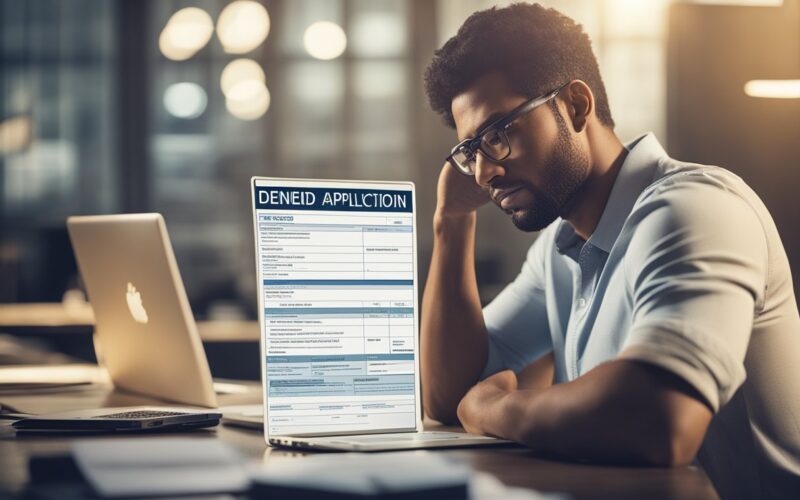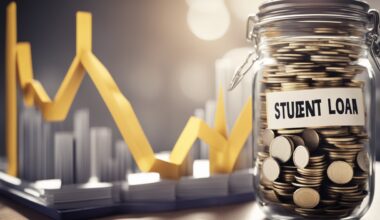Student loans for bad credit can be a lifesaver for students who are struggling to finance their education. A student loan is a type of loan that is designed specifically for students who need financial assistance to pay for their education. However, some students may have bad credit, which can make it difficult for them to get approved for a loan.
Having bad credit means that a borrower has a poor credit score, which is a numerical representation of their creditworthiness. A credit score is calculated based on a person’s credit history, and it ranges from 300 to 850. A low credit score can make it difficult for borrowers to get approved for loans, credit cards, and other financial products. However, there are student loans available for students with bad credit.
Student loans for bad credit can provide funding for education, but they often come with higher interest rates and fees than loans for borrowers with good credit. It’s important for students to shop around and compare different loan options to find the best deal. Students can also consider applying for federal student loans, which do not require a credit check.
Understanding Credit and Student Loans

When it comes to student loans, credit history plays a significant role in determining eligibility and interest rates. Individuals with bad credit may face challenges in securing loans or may have to pay higher interest rates. Therefore, it is essential to understand how credit history affects student loans.
The Role of Credit History in Student Loans
Credit history is a record of an individual’s borrowing and repayment activities. Lenders use this information to determine the borrower’s creditworthiness and ability to repay the loan. For student loans, credit history plays a critical role in determining the interest rates, loan amounts, and repayment terms.
Individuals with bad credit may face challenges in securing loans or may have to pay higher interest rates. However, there are options available for students with bad credit, such as federal student loans or private student loans with a cosigner.
Federal vs. Private Student Loans for Bad Credit
Federal student loans do not require a credit check, making them an ideal option for students with bad credit. These loans also come with special federal benefits, such as income-driven repayment plans and student loan forgiveness programs.
On the other hand, private student loans may require a credit check, and individuals with bad credit may face challenges in securing loans or may have to pay higher interest rates. Private student loans also come with varying interest rates and repayment terms, making it essential to research and compare options before making a decision.
Navigating Loan Options with Bad Credit

When it comes to financing higher education, bad credit can make it difficult to secure loans. However, there are still options available for students with less than perfect credit. This section will explore the different loan options and alternative financing methods available to students with bad credit.
Exploring Federal Student Loan Options
Federal student loans are often the first option for students who need to borrow money for college. The eligibility for these loans is based on financial need, not credit score. This means that students with bad credit can still qualify for federal loans.
There are two types of federal student loans: subsidized and unsubsidized. Subsidized loans are based on financial need and the government pays the interest while the borrower is in school. Unsubsidized loans are not based on financial need and the borrower is responsible for paying the interest.
Private Student Loans: Eligibility and Lenders
Private student loans are another option for students who need additional funding. However, private lenders often require a credit check and a co-signer with good credit. This can make it difficult for students with bad credit to qualify for private loans.
It is important to shop around and compare lenders when considering private student loans. Some lenders offer loans specifically for students with bad credit, but these loans often come with higher interest rates.
Alternative Financing: Scholarships, Grants, and More
In addition to federal and private student loans, there are alternative financing options available to students with bad credit. Scholarships and grants are a great way to pay for college without taking on debt. These are typically awarded based on merit or financial need and do not need to be repaid.
Work-study programs are another alternative financing option for students. These programs allow students to work part-time while attending school to earn money to pay for tuition and other expenses.
Overall, while having bad credit can make it more difficult to secure loans, there are still options available for students who need to finance their education. It is important to explore all options and compare lenders to find the best financing solution for your needs.
Repayment Strategies for Students with Bad Credit
Students with bad credit may face challenges when it comes to repaying their student loans. However, there are various strategies that can help them manage their debt and improve their credit score over time.
Understanding Repayment Options
It is important for students with bad credit to understand their repayment options. Federal student loans offer flexible repayment plans, such as income-driven repayment plans, that can help students manage their debt based on their income. Private lenders may also offer repayment plans, but they may not be as flexible as federal loans.
The Impact of Interest Rates on Repayment
Interest rates can have a significant impact on repayment. Students with bad credit may be charged higher interest rates than those with good credit. This can result in higher monthly payments and a longer repayment period. It is important for students to understand how interest rates work and how they can affect their repayment.
Loan Forgiveness and Assistance Programs
Loan forgiveness and assistance programs can also help students with bad credit manage their debt. Federal loan forgiveness programs, such as Public Service Loan Forgiveness, can help students who work in certain public service jobs have their loans forgiven after a certain period of time. There are also state-based loan forgiveness programs and other programs that can help students with their debt.
Overall, students with bad credit should explore all of their repayment options and make a plan that works for their specific situation. By making regular payments and taking advantage of loan forgiveness and assistance programs, students can successfully manage their debt and improve their credit score over time.
Improving Credit While Managing Student Loans
Managing student loans can be challenging, especially when dealing with bad credit. However, there are several ways to improve credit while managing student loans. In this section, we will discuss two of the most effective strategies: building credit as a student and refinancing options for graduates.
Building Credit as a Student
Building credit as a student is crucial to improving credit scores. One way to do this is by using a credit card responsibly. Students can apply for a secured credit card or become an authorized user on a parent’s credit card. By making on-time payments and keeping credit utilization low, students can establish a positive credit history.
Another way to build credit as a student is by making on-time payments on student loans. This not only helps to improve credit scores but also demonstrates financial responsibility to lenders. Students can also opt for income-driven repayment plans that allow them to make payments based on their income, making it easier to manage student loans.
Refinancing Options for Graduates
For graduates with bad credit, refinancing student loans can be a viable option. Refinancing involves taking out a new loan with a private lender to pay off existing student loans. This can result in lower interest rates and monthly payments, making it easier to manage debt.
However, it’s important to note that refinancing may not be the best option for everyone. Graduates with bad credit may not qualify for the best rates and terms, and refinancing federal student loans may result in losing certain benefits. It’s essential to research and compare lenders before deciding to refinance student loans.
Frequently Asked Questions
How can I obtain a student loan if I have bad credit and no cosigner?
Getting a student loan with bad credit and no cosigner can be challenging. However, there are some options available. One option is to apply for federal student loans, which do not require a credit check or a cosigner. Another option is to look for private lenders that offer student loans specifically designed for individuals with bad credit. Some lenders may require a cosigner, while others may not.
Are there emergency loan options available for students with poor credit?
Emergency loans are typically short-term loans that can help students cover unexpected expenses. Some colleges and universities offer emergency loan programs for students. These loans may be available to students with poor credit, but the terms and conditions may vary depending on the school. Additionally, some private lenders may offer emergency loans for students with poor credit.
What are the best student loan options for individuals with low credit scores?
If you have a low credit score, your best options for student loans may be federal student loans or private student loans that do not require a credit check. Federal student loans have fixed interest rates and flexible repayment options. Private lenders may offer variable interest rates and less flexible repayment options, but they may be more willing to work with individuals with low credit scores.
Is it possible to get a student loan without a credit check?
Yes, it is possible to get a student loan without a credit check. Federal student loans do not require a credit check, and some private lenders offer student loans that do not require a credit check. However, these loans may have higher interest rates and less favorable repayment terms than loans that require a credit check.
What are the requirements for federal student loans when you have bad credit?
Federal student loans do not require a credit check, so bad credit should not affect your eligibility for these loans. However, there are other eligibility requirements that you must meet, such as being enrolled in an eligible program and maintaining satisfactory academic progress.
Can you still be eligible for a Sallie Mae student loan with a minimum credit score?
Sallie Mae is a private lender that offers student loans to eligible borrowers. While Sallie Mae does consider credit scores when evaluating loan applications, having a minimum credit score does not necessarily disqualify you from getting a loan. Sallie Mae also considers other factors, such as income and employment history, when evaluating loan applications.











